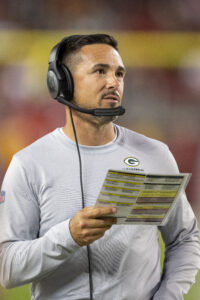Contractually speaking, it is difficult to find a direct comp to Jordan Love‘s climb. The Packers did extend Aaron Rodgers midway through his first season as a starter, but the team did not need to give its Brett Favre successor a contract that checked in first or even second in terms of average annual value in 2008. They did reach the NFL’s AAV ceiling for Love, and the Rodgers replacement’s four-year, $220MM extension — which the parties finalized Friday night — is now official.
While Joe Burrow and Trevor Lawrence are tied to $55MM-per-year deals like Love now is, the Bengals and Jaguars QBs are on five-year contracts. Negotiating in a contract year — whereas Burrow, Lawrence and Justin Herbert had two years left on their rookie deals — Love managed the $55MM AAV over a four-year contract, topping where the Dolphins went for Tua Tagovailoa earlier Friday. After contract structure was believed to loom as this negotiation’s final hurdle, Love secured favorable terms and will return to practice after a brief hold-in.
 The Packers guaranteed Love $100.8MM at signing, with Pro Football Talk’s Mike Florio noting the practical guarantee in this contract is $140.3MM. Against guarantees beyond Year 1 for non-quarterbacks, the Packers guaranteed Love’s 2025 base salary ($11.9MM) and part of his 2026 base ($49.9MM). The team guaranteed $10.9MM of that 2026 figure at signing, with the rest of that money shifting from an injury guarantee to a full guarantee in March 2025. Love will be a Packer by that March date, raising the practical guarantee to that $140.3MM point.
The Packers guaranteed Love $100.8MM at signing, with Pro Football Talk’s Mike Florio noting the practical guarantee in this contract is $140.3MM. Against guarantees beyond Year 1 for non-quarterbacks, the Packers guaranteed Love’s 2025 base salary ($11.9MM) and part of his 2026 base ($49.9MM). The team guaranteed $10.9MM of that 2026 figure at signing, with the rest of that money shifting from an injury guarantee to a full guarantee in March 2025. Love will be a Packer by that March date, raising the practical guarantee to that $140.3MM point.
This contract does include a record-setting signing bonus of $75MM. Love will see that money in three 2024 installments, collecting the bonus — which will be used to spread out the QB’s cap hits — by December, Florio adds. The Packers are also using a rolling guarantee structure for Love’s 2027 payout. Of Love’s $41.9MM 2027 base salary, $20MM is guaranteed for injury at signing and becomes fully guaranteed on Day 5 of the 2026 league year.
Further spreading out Love’s cap hits, Florio indicates $39.5MM of Love’s 2026 base salary and $31.5MM of his 2027 base will convert to option bonuses in those years. After just two seasons, Love’s full guarantee balloons to $160.3MM. If the Packers cut Love in 2027, Florio adds the $20MM injury guarantee includes offset language.
Addressing the contract Saturday morning, Matt LaFleur said (via the Green Bay Press-Gazette’s Ryan Wood) it is difficult to argue anyone outplayed Love during last season’s second half. Love indeed led the NFL in QBR from Weeks 11-18, throwing 18 touchdown passes and one interception in that span. This continued with a dominant outing in a wild-card upset win in Dallas. For the full season, Love ranked ninth in QBR.
 Taking considerable heat upon trading up for Love in 2020 — a decision that indeed deprived the last wave of Rodgers-era teams of a first-rounder who would help Super Bowl-contending squads — the Packers are making a seismic bet last season’s second half will lead to another run of stability at the QB position. They have enjoyed an unparalleled run, of course, at this position, as Favre lasted 16 seasons and Rodgers 15 as the team’s starter.
Taking considerable heat upon trading up for Love in 2020 — a decision that indeed deprived the last wave of Rodgers-era teams of a first-rounder who would help Super Bowl-contending squads — the Packers are making a seismic bet last season’s second half will lead to another run of stability at the QB position. They have enjoyed an unparalleled run, of course, at this position, as Favre lasted 16 seasons and Rodgers 15 as the team’s starter.
LaFleur said (via SI.com’s Bill Huber) he became comfortable with Love replacing Rodgers after the 2022 season due to how the 2020 draftee played during the preseason and on Green Bay’s scout team during the regular season. This led to a separation that involved two second-round picks coming back to Green Bay in last year’s Rodgers trade.
The outlier organization when it comes to quarterback development, the Packers are again betting on a season’s worth of starts will be indicative of long-term success. The Ted Thompson regime was certainly right on Rodgers, who was considered a higher-level prospect compared to Love. By parking Love for three seasons, the team missed out on the chance to build around Love’s rookie-scale contract and now will go from carrying a $40.3MM Rodgers dead money hit in 2023 to rostering a record-setting Love deal in 2024. Gutekunst acknowledged this contract will create cap challenges, via Huber, but noted he would rather be in that boat than lacking a good quarterback.
Both Love and Tagovailoa benefited from their teams waiting until Year 5 to complete extensions, as each secured four-year terms to move them into position for lucrative third contracts earlier. This NFL period has generally featured franchise-level first-round QBs being extended in Year 4, giving teams an extra year of control. Because of Tagovailoa’s injury issues and uneven career start, the Dolphins waited. The Packers reached a half-measure extension (two years, $13.5MM) with Love last year, rather than exercise a fifth-year option on a QB who had barely played. Less than 18 months later, the Utah State product required a record-setting contract, illustrating the leverage quality quarterbacks — even those without extensive sample sizes — possess in today’s game.